丁往道英语写作手册 part3 第三题答案
丁往道英语写作手册 part3 第三题答案
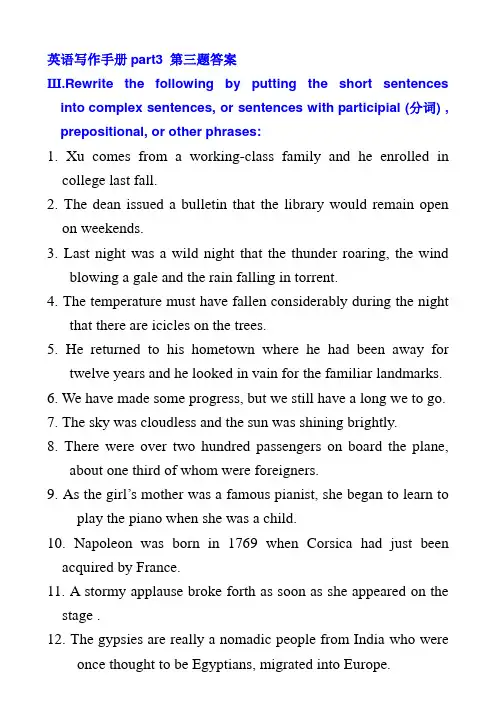
英语写作手册part3 第三题答案Ш.Rewrite the following by putting the short sentences into complex sentences, or sentences with participial (分词) , prepositional, or other phrases:1. Xu comes from a working-class family and he enrolled in college last fall.2. The dean issued a bulletin that the library would remain open on weekends.3. Last night was a wild night that the thunder roaring, the windblowing a gale and the rain falling in torrent.4. The temperature must have fallen considerably during the nightthat there are icicles on the trees.5. He returned to his hometown where he had been away fortwelve years and he looked in vain for the familiar landmarks.6. We have made some progress, but we still have a long we to go.7. The sky was cloudless and the sun was shining brightly.8. There were over two hundred passengers on board the plane,about one third of whom were foreigners.9. As the girl’s mother was a famous pianist, she began to learn toplay the piano when she was a child.10. Napoleon was born in 1769 when Corsica had just been acquired by France.11. A stormy applause broke forth as soon as she appeared on the stage .12. The gypsies are really a nomadic people from India who wereonce thought to be Egyptians, migrated into Europe.13. Because of the new workers are young and inexperienced, theyare eager to learn from the veteran worker.14. It was a poor quarter where there were lot of small huts whichdoted a hillside with mud walls and straw roofs.15. Hearing that his father was ill, he was anxious to go home tosee him, so he went to the station early in the morning to buya ticket.。
英语写作基础教程答案第三版 丁往道chapter3
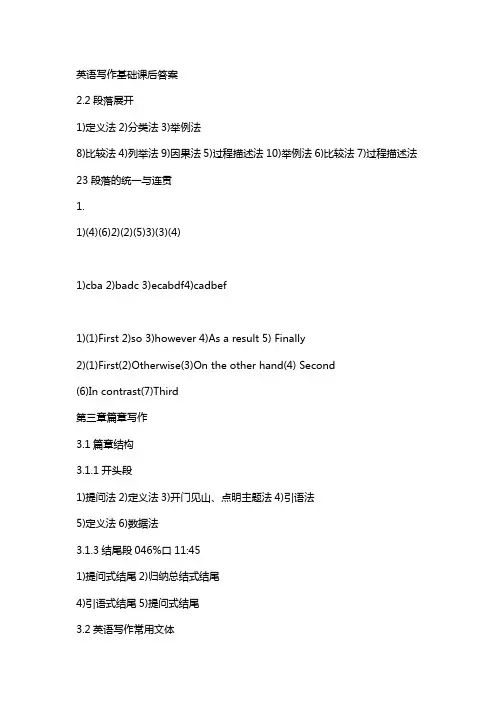
英语写作基础课后答案2.2段落展开1)定义法2)分类法3)举例法8)比较法4)列举法9)因果法5)过程描述法10)举例法6)比较法7)过程描述法23段落的统一与连贯1.1)(4)(6)2)(2)(5)3)(3)(4)1)cba 2)badc 3)ecabdf4)cadbef1)(1)First 2)so 3)however 4)As a result 5) Finally2)(1)First(2)Otherwise(3)On the other hand(4) Second(6)In contrast(7)Third第三章篇章写作3.1篇章结构3.1.1开头段1)提问法2)定义法3)开门见山、点明主题法4)引语法5)定义法6)数据法3.1.3结尾段046%口11:451)提问式结尾2)归纳总结式结尾4)引语式结尾5)提问式结尾3.2英语写作常用文体l.1)说明文2)议论文Il.(For reference only)3)叙述文(5)However(8)And(9)But(10)In spiteof3)个人见解式结尾6)归纳总结式结尾Spring Festival is a wonderful time of the year to spend with one's family. People who work and study far away from their homes come back.Theytell each other about their work and life,exchange gifts and eat lots of delicious food with their family members.Spring Festival is also a great time to visit one'sfriends.During the holiday, many people go to see their friends and share their interesting stories or workexperiences.Students love to go out with their formerclassmates and enioy talking about their life.Manystudents also like to visit their teachers and wish them a happy new year However, there are times during the Spring Festival when it's nice iust to be by yourself. You can read novels that you never seem to have time to read at school.You can watch your favorite TV programs athome.You can have a quiet walk in your neighborhood or in a park nearby and think about your busy life. Spring Festival is an enjoyable time for everyone46%口11:46II(For reference only)A proverb says,“Time is money.” But in my opinion time is even moreprecious than money because when money is spent, we can earn it back; but when time is gone, it will never return.Thus we must value time.Time passes very quickly.Some students say they do not have enough time for all their lessons.Actually they do not know how to make use of their time.They spend their precious time smoking,drinking, chatting, playing games and doing other useless things.They don't realize that wasting time is equal to wasting a part of their valuable life.Today we are living in the twenty-first century.We know that time is life.When a person dies, his time has ended.Since life is short,we should devote our time and energy to our studies so that we will be able to serve our country and society.We should form thehabit of saving time.We shouldn 't put off what can be done today till tomorrow Laziness will not only bring us failure but also lead us to the road of poverty.。
丁往道英语写作手册
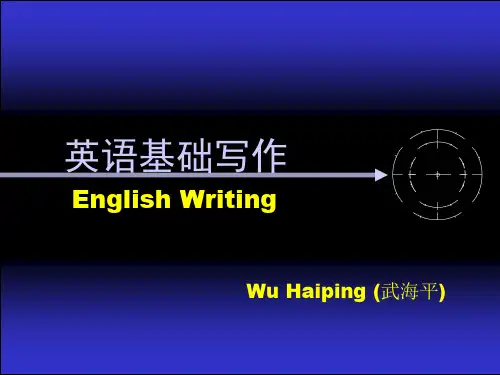
Part1 Manuscript Form 文稿格式
1 Arrangement 安排 2 Capitalization 大写 3 Word Division 移行 4 Punctuation 标点 5 Handwriting 书法
What is a good manuscript form?
writing the title 写标题 leaving margins 纸边留空 indenting 段落开端缩进 capitalizing 大写 dividing words 词的移行
1 Arrangement 安排
About titles关于题目
P 35 Ⅱ. Type of Sentences 句子类型
(use)
1. Declarative, interrogative, imperative, and exclamatory sentences 陈述句、疑问句、祈使句和感叹句
1. declarative sentence 陈述句 She is my fiance.
P35 Ⅱ. Type of Sentences 句子类型
(structure)
2 .simple, compound, complex, or compound-complex sentences 简单句、并列句、复合句或并列复 合句
simple sentence 简单句
It has one subject and one predicate verb. To see is to believe.
丁往道《英语写作手册(中文版)》复习笔记(造句)【圣才出品】
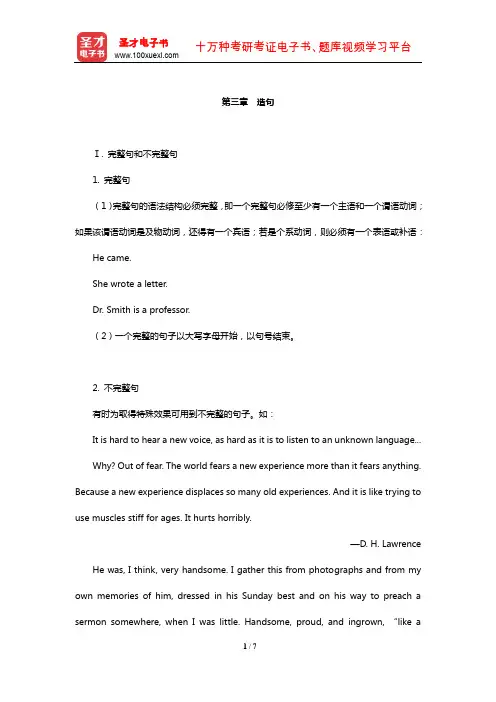
第三章造句Ⅰ. 完整句和不完整句1. 完整句(1)完整句的语法结构必须完整,即一个完整句必修至少有一个主语和一个谓语动词;如果该谓语动词是及物动词,还得有一个宾语;若是个系动词,则必须有一个表语或补语:He came.She wrote a letter.Dr. Smith is a professor.(2)一个完整的句子以大写字母开始,以句号结束。
2. 不完整句有时为取得特殊效果可用到不完整的句子。
如:It is hard to hear a new voice, as hard as it is to listen to an unknown language...Why? Out of fear. The world fears a new experience more than it fears anything. Because a new experience displaces so many old experiences. And it is like trying to use muscles stiff for ages. It hurts horribly.—D. H. Lawrence He was, I think, very handsome. I gather this from photographs and from my own memories of him, dressed in his Sunday best and on his way to preach a sermon somewhere, when I was little. Handsome, proud, and ingrown, “like atoe-nail,” somebody said.—James Baldwin 在上面第一篇中有三个不完整的句子(“why?”“Out of fear.”以及“Because a new experience...”),在第二篇中有一个(“Handsome,proud”)。
北外丁往道《英语写作手册》教案
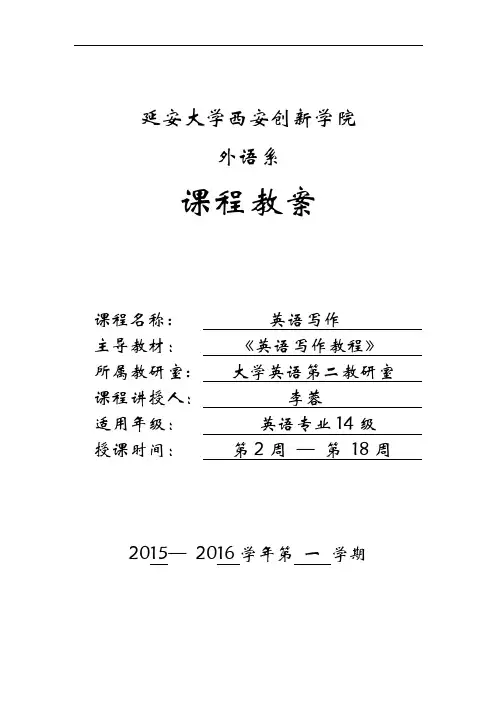
延安大学西安创新学院外语系课程教案课程名称:英语写作主导教材:《英语写作教程》所属教研室:大学英语第二教研室课程讲授人:李蓉适用年级:英语专业14级授课时间:第2周—第18周2015—2016学年第一学期课程教案课程教案课程教案课程教案课程教案课程教案课程教案课程教案延安大学西安创新学院外语系课程教案课程教案课程教案课程教案1.1 Common features of good writing1. To express a clear point means to convey the writer's main idea or--in the case of descriptivewriting--the significance of the object, place or person described; in other words, an attentive reader should be able to grasp the writer's purpose.2. To be tightly structured, writing should contain logical or associative connections and transitions which clearly express the relationship of the ideas described.3. To be grammatically and syntactically correct, writing should adhere to the rules of Standard American English, including proper punctuation and spelling. If writers choose to use unconventional syntax, they should be able to justify their choices.1.2Cultural differences in writing1. Different ways of thinking2. Different ways of analysis3. Concrete thinking and abstract thinking4. Different valuesValues on space-timeValues on human behaviorsValues on social relationships1.3English writing VS. Chinese writing1.Chinese writers tend to be ―indirect‖, while Anglo-Americans are found to be more ―direct‖.2.English and Chinese writing differ in sentences and word variety.3.English is found to use more connectives than Chinese, both between clauses or sentences andbetween paragraphs.1.4Strategies in learning English writing1. From the beginning, you have to learn how to write an English essay.2. English writing tends to be more ―rigid‖ than Chinese writing.3. Remember that reading helps to learn how to write.4. Writing is also learned through writing.1.5 Homework1. Go over the following paragraphs, one in English and the other in Chinese, and decide which sentence in each paragraph express the author’s main idea. Write your answers on the space provided.2. What do you think translation form a preconceived Chinese version needs to be avoided when we are writing in English? Discuss with your partners and then list at least three reasons on the space provided.课程教案Part T wo Diction2.1Levels of words ----Three levels⑪Formal words: Also learned words, literary words or ―big‖ words, containing three or more than three syllables, seldom used in daily conversation, e.g. enough-sufficient; deal with-handle.⑫common words: Most of the words people use every day and appear in any types of writing, e.g. question, brother.⑬informal words: Mainly used in informal or colloquial words, short and seldom appear in formal writing, such as guy-man, puppy, daddy, slang.2.2 General and specific wordsComparatively speaking, some words are more general or more specific in meaning than other words. P rofessionals, for instance, is more general than scientists, doctors, teachers, lawyers, journalists, etc, all of which are more specific. But scientists may be called a general word then compared with physicists or chemists, which, in turn, is more general than biochemists.Specific words help to make the writing clear, vivid, exact, colorful and attractive; they can make the readers see, hear or feel what the writer wants to describe; they can provide more details and information, the writing will be effective and impressive. More examples:A good man----kind, honest, generous, warm-hearted, brave, selfless, etc.Good food----delicious, tasty, nourishing, wholesome, fresh, rich, etc.House----mansion, villa, cottage, cabin, hut, shed(棚屋,小屋),etc.Laugh----smile, grin, giggle, chuckle(嗤的一声笑,低声笑),etc.2.3 Rules to choose words in writing an essay (or a formal writing)⑪Sentences tend to be longer and more complex. E.g. see text book P30⑫Limit your use of subjective pronouns, often using ―it‖ or passive voice. E.g. see P31⑬A void using informal or colloquial words. E.g. take in—deceive; go back—return; a lot—several/many/much/a large amount/number of; let—allow/permit; fellow—person; kind of—somewhat; like—as if/appear.⑭A void using general words, using more specific words. E.g. good, bad great, interesting, very, really, too, etc, are general. (informal) Mary is an interesting person.----Mary is humorous and intelligent.(formal)⑮A void contractions(缩写)and abbreviations(缩略词): don’t—do not; we’ll—we will; can’t—can not; TV—television;i.e.—that is; ad—advertisement.⑯Do not start a sentence with a coordinating conjunctions, but a subordinating conjunction can serve the purpose.E.g. He is usually easy-going. But—however before his first cup of tea, he is a bear.2.4 Figures of speech1. Simile: a comparison between two distinctly different things and the compassion is indicated by the word ―as‖ or ―like‖.E.g. My love is lie a red rose.The old man’s hair is as white as snow.2. Metaphor: also a comparison of similarities between two different things, but the comparison is implied, not expressed by ―as‖ or ―like‖.E.g. My love is a red rose. He is the soul of the team.The life of poor people was carved so sharply in his heart that he could never forget it.3.Personification: to treat a thing or an idea as if it were human or had human qualities.E.g. this time fate was smiling to him. Dust came silently.4. Metonymy(借喻): using the name of one thing to refer to another thing which is closely related.E.g. When the war was over, he laid down the sword and took up the pen.His purse would not allow him to buy that car.5.Irony(反语): the use of words which are clearly opposite to what is meant, to achieve a special effect.E.g. Y ou come so early, I have waited for more than an hour!6. Overstatement and understatement(含蓄表达、保守说法、低调):to exaggerate and play down respectivelyE.g. She is dying to know what job has been given her.It took a few dollars to build this indoor swimming pool.7. Alliteration(头韵): the appearance of the same initial sound in two or more words.E.g. He is as proud as a peacock.We are fighting for our health and home.2.5 Homework1.In each sentence, choose the more precise of the two in italics;2.Identify the sentences as formal, less formal and informal; the figure of speech used in each of the following sentences.4. Preview Chapter Three.课程教案Part Three Sentences3.1Error-free sentences1.subject-verb agreementRule: the subject and verb of each clause must agree in number. If you have a singular subject, you need a singular verb; if you have plural subject, you need a plural verb.E.g. The family are watching TV together.An average family today is a great deal smaller than it used to be.Either you nor I am responsible for the mistake.There is a sofa and two chairs in the room.One-third of the people/water were over 50/was polluted.2.Word orderRule: the subject precedes the verb which is followed by other elements, such as object, complements, and adverbials: basic pattern of an English sentence: subject+verb+objectE.g. I like reading novels.When two or more than two complements or adverbials, the following guidance should be followed:⑪ Two when-adverbials—P60 1⑫ Two time-adverbials of different types –P60 2⑬ Place-adverbials of several types—P60 3⑭A process-adverbial, a time-adverbial and a place-adverbial used together—P60 43.Shift in tenseRule: the tense of your verb tells when events are taking place—whether in the past, the present or future. When staring writing an essay, establish a ―base tense‖, and shift away form it only of good reasons.E.g. Exercises see P 654. Shift in personRule: establish a steady, reliable point of view and keep the point of view consistent in all the sentences, which can make the writing clear and help the readers know whom you are talking to.E.g. See P66 example⑪ First person singular⑫ First person plural⑬ Second person singular or plural⑭ Third person singular and pluralExercise: Write a paragraph to describe precisely how the following things are done.①How to make jiao-zi.②How o bowwow a book form the library.5. Balance and parallelismRule: using the same pattern of words to show that two or more ideas have the same level of importance. This can happen at the word, phrase or clause level, adding power to your writing.E.g. Two examples see P683.2 T ypes of sentences (or variety in sentences)1. According to their use, sentences are declarative, interrogative, imperative and exclamatory.E.g. Making sentences by the students2. According to their structure, sentences are simple, compound, complex and compound-complex.⑴S imple sentence: containing only one subject part(主语部分) and one predicate part.E.g. See P 83⑵Compound sentence: being made up of two or more simple sentences. These simple sentences are related in meaning, and are usually linked by one of the connectives (for, and, but, or, so, nor, and yet) or by a semicolon (;).E.g. Examples see P 84⑶complex sentences: definition see P84E.g. Examples see P84⑷compound- complex(并列复杂句): being made up of two or more simple sentences and one or more subordinate clauses.E.g. Examples: see P843. According to their length, sentences are short sentences and long sentences⑴short sentence: with fewer than 15 words;⑵long sentence: with longer than 20 words.Rule: short sentences are powerful, working well at the beginning of a paragraph to get attention or at the end to summarize; long sentences are used in the body of a paragraph to express detailed information or complex ideas. Remember too many are bad for your writing, no matter short or long sentences.E.g. See example on P109⑶Ways to expand simple sentences①Tightening: cutting extra words, not contributing to your message.E.g. See P111②coordination: combining two or more independent main clauses into a compound sentence by using the connectives BOYFANS(but, or, yet , for ,and, nor ,so)E.g. See P113③subordination: combining two or more independent main clauses into a complex sentence or a compound-complex sentence by using the connectives BE WISE AT W AR(because, even though, when/where/why/who, if, since, even if; although, though, while, as, whereas)E.g. Tom was absent half of the classes last semester. His mother was seriously ill. He passed the final examination with high scores.4. From the rhetorical point of view, sentences are loose sentences(松散句), periodic sentences(重尾句/调尾句) and balanced sentences.⑴Loose sentences: sentences that have the main point at the beginning are called as loose sentences, and the elements following the main point/clause are closers(can be words, phrases or clauses). This kind of sentences is clear and easy.E.g.Y ou will do better in the exam if you work hard nest term.I have to go to the library to read a new magazine today.⑵Periodic sentences: having the main point at the end of the sentences, and the elements before the main point/clause are openers(can be words, phrases or clauses).E.g. If you go to visit your grandma, do not forget to bring her this basket of apples.Following his advice, I passed the test.More examples see P141⑬Balanced sentences: in balanced sentences, words, phrases or clauses balance each other because of their likeness in structure, meaning or length. This kind of sentences emphasizes the correspondences or contrasts between the elements.E.g. See P 142Notes:1. Choose the content and examples with √ to teach in class;2. Choose some of the exercises to finish as there are many of them in books.课程教案Part Four Paragraphs4.1Effective paragraph1.UnityIf all the sentences in the paragraph lead to one central theme, the paragraph is unified. Thecentral theme is usually summarized in what is called the topic sentence.2.CoherenceThe sentences in a paragraph should be arranged in a clear, logical order, and the transitions should be smooth and natural, so readers can easily follow the writer’s thought and understand what he is talking about.3. TransitionsProper transitions can make the paragraph smooth and clear. (give students extra handouts) e.g. (three topic sentences to illustrate the above three points, ask students to write a paragraph based on one of them and choose one paragraph of students to explain in class)1. Once people were very afraid of ghosts.2. It is generally believed that being honest is not only beneficial to ourselves but also to others and the whole society.3. The students’ use of computers has grown rapidly in recent years.4.2 Ways of developing paragraphs4.2.1 Planning a paragraph1. Think of the topic or main idea or theme: a topic sentence is a sentence that indicates in a general way that idea the paragraph is going to deal with.(《写作教程》P136);2. Express it in a complete sentence (topic sentences);3. Think of the details or examples or facts that may be used to support or explain the main idea;4. Arrange them in logical orderE.g. example see <英语写作教程>P158 √4.2.2 Development by exampleSome topics need to be supported by examples which can make our writing clear and persuasive. Examples can be a fact, a historical example, a statistic, an event, or a behavior. It may come from our general knowledge, from reading or from person experience.Transitions: such as, take…for example, a leading example is, more transitions see handout.E.g. example see P 160 √Exercise: theme/central idea1. this term several useful and interesting courses have been offered.2. a classmate who is hard working3. TV has negative effects on children4.2.3 Development by comparison and contrastComparison and contrast are formal ways to organize our thoughts. Comparison explains seminaries and contrast explains differences, both of which can help us evaluate subjects to understand their advantages and disadvantages, or strengths and weaknesses.There two basic types of organizing a comparison and contrast paragragh: the point-by point method and the block method. 解释见P165及P166 表格Transitions: likewise, in opposition to, differ from, more see handoutsE.g. example see P166 high school life and college lifeExercise:1. I prefer South Korean love stories on TV to the Chinese ones (or vice versa)2. Riding a bicycle is preferable to driving a car.3. Raising plants involves nearly as much care and knowledge as raising children.4.2.4 Development by cause-and-effectCause-and-effect paragraphs investigate why things are as they are, or why things happened, or the effects of an event or a situation. Generally, in a paragraph, it is better to deal with either causes or effects. Rather, it is a problem of the focus of your paragraph(虽然cause和effect同时出现,但必须有所侧重, 如earthquake 侧重描述后果,而环境污染侧重原因披露). Transitions:seeing that, thanks to, for that reason, more see handoutsE.g. see two examples on P167-168Exercise:1. the improvement of transportation in…2. college students doing part-time jobs3. The rate of teenage nearsightness is much higher in china than inmost other countries.4.2.5 Development by classificationA classification paragraph explains a subject by dividing into separated types or groups, i.e. categories. Y ou may break down your topic into different categories, but you should identify the basis for the classification, that is, to remember to group items into categories according to some consistent principle.Transitions: divide into, primary, secondary, more see handout.E.g. see example on P 164Exercise:1.the movies you have seen2.your clothes3.High school teachers tend to sort their students in to the following categories: pleasant highachievers, unpleasant high achievers, the average, pleasant underachievers, and unpleasant underachievers.4.3Homework1.In the following paragraphs, identify the topic sentence, emit the irrelevant sentences andpoint the transitions. (handbook P113)2. Write different types paragraphs on the basis of the materials provided in class.课程教案Chapter Five Passage writing----CET 4 5.1出题方式1. 提纲式文字命题2. 提纲式图表命题3. 情景式命题5.2高分作文1. 主题突出,内容切题、统一、充实2.表达清楚,文字连贯3. 句式多变,逻辑严密4.语言规范、准确,格式、标点规范5.字数130-1506.检查拼写、语法是否正确,句子是否完整5.3 写作类型一. 现象解释型:要求考生从试题的提示性文字或图表入手,描述其所反映出的现象,对该现象进行解释说明,分析其原因并加以评论。
英语写作手册第三章
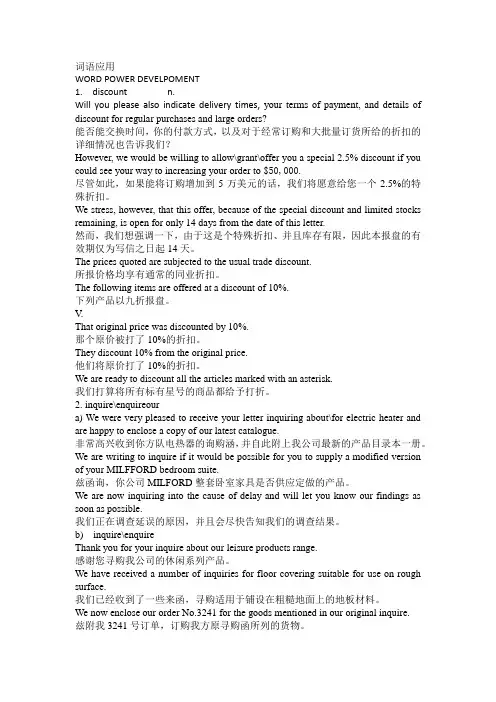
词语应用WORD POWER DEVELPOMENT1. discount n.Will you please also indicate delivery times, your terms of payment, and details of discount for regular purchases and large orders?能否能交换时间,你的付款方式,以及对于经常订购和大批量订货所给的折扣的详细情况也告诉我们?However, we would be willing to allow\grant\offer you a special 2.5% discount if you could see your way to increasing your order to $50,000.尽管如此,如果能将订购增加到5万美元的话,我们将愿意给您一个2.5%的特殊折扣。
We stress, however, that this offer, because of the special discount and limited stocks remaining, is open for only 14 days from the date of this letter.然而,我们想强调一下,由于这是个特殊折扣、并且库存有限,因此本报盘的有效期仅为写信之日起14天。
The prices quoted are subjected to the usual trade discount.所报价格均享有通常的同业折扣。
The following items are offered at a discount of 10%.下列产品以九折报盘。
V.That original price was discounted by 10%.那个原价被打了10%的折扣。
They discount 10% from the original price.他们将原价打了10%的折扣。
Lecture 7 level of words 《英语写作手册》丁往道编 外研社
• 这是林肯总统给烈士母亲比克斯比夫人慰问信中的一句
话。比克斯比夫人的五个儿子都在南北战争中光荣牺牲。 句中用了文体正式程度很高的词.
• Now compare these pairs of verbs: • Common
• 1. He checked up on his accountant. • 2.They put up with their neighbors. • 3.She caught on very quickly. • 4.She made up for it with an early night. • 5.He went down with a fever. The cost of living went up.
mon/ Neutral (good for all kinds of writing) —Most frequently used
• College papers • Mass publications • Business communications
—For educated persons
e.g.: It is very/damn great. 2. Using the Exact Word
—Meaning of words e.g.: major study / academic study 3. Using Figurative Language
—Figures of speech e.g.: My love is like a red, red rose.
丁往道《英语写作手册(中文版)》复习笔记(措辞)【圣才出品】
第二章措辞Ⅰ. 词的类型据语体风格,常用的词(规范英语词汇)可分为三类:正式的、一般的、非正式的。
1. 正式词汇(又称作学术性的词、文雅的词或“大”词)(1)适用文体正式文体,如学术性或理论性著作、政治和法律文件,以及正式的演讲或报告。
(2)特点多有三个以上的音节,多数源于希腊或拉丁文。
下面这段文章中包含一些体现正式文体的词汇:There is nothing new in the recognition, within a given language, of a distinction between common usage and uses of the language for more restricted purposes and often enough, perhaps characteristically, more elevated purposes. The monolithic nature of English is not questioned when literary essayists like Emerson contrast poetry and common speech. The latter is recognized in America to be the proper subject for the investigation of linguists who, however, now show some incipient inclination to investigate poetry, too, and other noncasual utterances in a given language.—C. F. Voegelin 正式的或学术性的词汇有:recognition, characteristically, elevated, monolithic,investigation, incipient, inclination, noncasual, utterances等。
英语写作手册第三版课后答案part two
英语写作手册第三版课后答案part two1、Since we have _____ money left,we can't afford the expensive computer. [单选题] *A. a littleB. a fewC. little(正确答案)D. few2、I have a _____ every day to keep fit. [单选题] *A. three thousand meter walkB. three-thousands-meters walkC.three-thousand-meters walkD. three-thousand-meter walk(正确答案)3、( )He killed the enemy guard and made away _________the villagers. [单选题] *A. with the helpB. with helpC. with help ofD. with the help of(正确答案)4、I walked too much yesterday and ()are still aching now. [单选题] *A. my leg's musclesB. my leg muscles(正确答案)C. my muscles' of legD. my legs' muscles5、_____, Martin can reach the branch of that tall tree at the gate. [单选题] *A. As a short manB. Being shortC. As he is shortD. Short as he is(正确答案)6、Obviously they didn’t see the significance of the plan. That is()the problem lies. [单选题] *A. where(正确答案)B. whyC. /D. how7、——Can you come on Monday or Tuesday? ——Im afraid()of them is possible. [单选题] *A.neither(正确答案)B. eitherC. noneD.both8、7.—________ is the Shanghai Wild Animal Park?—It’s 15km east of the Bund. [单选题] * A.WhoB.WhatC.WhenD.Where (正确答案)9、—Would you like some milk?—Yes, just _____, please. [单选题] *A. a little(正确答案)B. littleC. a fewD. few10、Many young people like to _______ at weekends. [单选题] *A. eat out(正确答案)B. eat upC. eat onD. eat with11、We should _______ a hotel before we travel. [单选题] *A. book(正确答案)B. liveC. stayD. have12、The traffic jams often happen in _______ hours. [单选题] *A. lunchB. workC. leisureD. rush(正确答案)13、Almost every one of us could see her anxiety from the()on her face. [单选题] *A. appearanceB. feelingC. movementD. expression(正确答案)14、We can see ______ stars at night if it doesn’t rain. [单选题] *A. a thousand ofB. thousandsC. thousand ofD. thousands of(正确答案)15、If you get _______, you can have some bread on the table. [单选题] *A. happyB. hungry(正确答案)C. worriedD. sad16、Though my best friend Jack doesn’t get()education, he is knowledgeable. [单选题] *A. ManyB. littleC. fewD. much(正确答案)17、—______some nice crayons. I think they are ______.()[单选题] *A. Here is; Betty’sB. Here are; BettyC. Here is; BettyD. Here are; Betty’s(正确答案)18、Mike and his friend are going to the _______ to see the new action movie tonight. [单选题] *A. book shopB. restaurantC. concertD. cinema(正确答案)19、He doesn’t smoke and hates women _______. [单选题] *A. smokesB. smokeC. smokedD. smoking(正确答案)20、______ pocket money did you get when you were a child? ()[单选题] *A. WhatB. HowC. How manyD. How much(正确答案)21、____ father is a worker. [单选题] *A.Mike's and Mary'sB. Mike and Mary's(正确答案)C. Mike's and MaryD. Mike and Marys'22、You can't rely on Jane as she is _____ changing her mind and you will never know what she is going to do next. [单选题] *A. occasionallyB. rarelyC. scarcelyD. constantly(正确答案)23、23.Hurry up! The train ________ in two minutes. [单选题] *A.will go(正确答案)B.goC.goesD.went24、My brother often does ______ homework first after school.()[单选题] *A. heB. his(正确答案)C. sheD. her25、It’s one of _______ means of transportation. [单选题] *A. cheapB. convenientC. second-handD. the most convenient(正确答案)26、There are trees on both sides of the broad street. [单选题] *A. 干净的B. 狭窄的C. 宽阔的(正确答案)D. 宁静的27、I_____you that I had made the right decision. [单选题] *A.ensuredB.insuredC.assured(正确答案)D.for sure28、—Why do you call him Mr. Know?—______ he knows almost everything that we want to know.()[单选题] *A. SoB. OrC. ButD. Because(正确答案)29、I saw the boy _______?the classroom. [单选题] *A. enter intoB. enter(正确答案)C. to enter intoD. to enter30、We can _______ some information about this city on the Internet. [单选题] *A. look up(正确答案)B. look likeC. look afterD. look forward to。
英语写作手册 PART THREE 参考答案
《英语写作手册》 PART THREE 参考答案I. Read the following and say what kind of sentence each is (loose, periodic, balanced):1. P2. P3. P4. L5. B6. P7. P8. P9. B 10. BII. Read the following, point out the mistakes and make necessary corrections:1. Our host entertained us with many interesting stories of adventures, for he had been a member of an exploration team working in the Arctic.2. When I woke up, I saw him asleep in bed. But I had not heard him when he came back because I had been sleeping soundly.3. Liu always did his work a little better than his fellow workers, so he got higher pay than others.4. No student could answer that question, including Yao. Though he was usually quick in answering questions, he was silent.5. Lin looks like Li; however, they are not related.6. The old man hunched forward, with his head tilting at an angle, eyes half closed, looking very sleepy.7. Because their work was well planned, everybody worked with great enthusiasm, and they over fulfilled their quota.8. Mark Twain’s experience as a pilot on a steamboat was no doubt an important factor that helped him to become a famous writer.Ш. Rewrite the following by putting the short sentences into complex sentences, or sentences with participial, prepositional, or other phrases:1. Xu comes from a working-class family, and he enrolled in college last fall.Xu who enrolled in college last fall comes from a working-class family.Xu, who enrolled in college last fall, comes from a working-class family.Though Xu comes from a working-class family, he enrolled in college last fall.Xu who comes from a working-class family enrolled in college last fall.Xu, who comes from a working-class family, enrolled in college last fall.2. The dean issued a bulletin that the library would remain open on weekends.3. Last night was a wild night, the thunder roaring, the wind blowing a gale, and the rain falling in torrents.4. The temperature must have fallen considerably during the night because there are icicles on the trees.5. He returned to his hometown that he had been away from for twelve years and looked in vain for the familiar landmarks.Because he had been away for twelve years, he returned to his hometown and looked in vain for the familiar landmarks.6. We have made some progress, but we still have a long we to go.Though we have made some progress, we still have a long we to go.7. The sky was cloudless, the sun shining brightly.8. There were over two hundred passengers on board the plane, about one third of whom were foreigners.9. The girl began to learn to play the piano when she was a child as her mother was a famous pianist.10. Napoleon was born in 1769 when Corsica had just been acquired by France.11. A stormy applause broke forth as soon as / when she appeared on the stage.12. The gypsies, who were once thought to be Egyptians migrating into Europe,are really a nomadic people from India.13. Because the new workers are young and inexperienced, they are eager to learn from the veteran workers.14. It was a poor quarter with a lot of small huts, dotting a hillside with mud walls and straw roofs.15. Hearing that his father was ill, he was anxious to go home to see him, so he went to the station early in the morning to buy a ticket.2.To omit unnecessary elements3.To connect related words/ parts properly1. She began to speak at the meeting at ten o’clock.2. Bernard Shaw was one of the best-known playwrights in the world.3. The houses were mere shanties with rags stuffed in the cracks and holes.4. The novel I read on the train didn’t interest me at all.5. The well-dressed man who admitted us to the house was later learned to bea thief.6. I lost some important documents. With the help of the police, I found them three days later.7. When we entered the shop, a saleswoman greeted us. We saw all kinds of shores on the shelves. Because the prices were quite reasonable, a lot of customers were buying them.8. Tell Helen I will come to see her if she is at home.9. Listening attentively, I heard a faulty sound.10. On entering the room, I saw no one.11. Fred is so energetic and capable that you can rely on him.12. The children promised to be careful and return home early.13. Dickens’s novels offer no solution to the social injustices that he exposes.Dickens offers no solution to the social injustices that he exposes in novels.14. Either my watch is fast, or yours is slow.15. Glancing out of the window, I was attracted by a beautiful view.16. He finished reading ten books during the vacation.17. If interested in painting, you can take a course at the evening school.18. She said that she would come if she could. She also told us not to wait for her if she didn’t come.19. I told my friend the good news at once after I posted the letter.I told my friend the good news that the letter was posted at once.20. I like his poems, so I will go to his lecture.I will go to the lecture because/if I like his poems.V. Revise the following sentences. Try to make them concise.Ways to achieve conciseness1.Avoiding repetition2.Deleting unrelated / unnecessary words or phrases3.Changing the sentence structure1. In 1840, the Opium War broke out.2. There are more books in their library than in ours.3. He returned home after he graduated from college.4. We planned to meet just before sunrise.5. The flood was due to the heavy rain in late spring.6. He was asked to repeat the sentence.7. I play badminton as well as my brother.8. It seemed to his friends that his attitude was puzzling.9. These watermelons are large and sweet.10. He did not tell the truth.11. A number of students want to join the drama club.12. He was kind enough to let me share the umbrella.13. Zhao was elected the representative of the class by the whole class.14. At present I am taking the course of World History and a course in geography.15. The plane circled the airport for about ten minutes and then disappeared.16. In my opinion, he has not done his work very well.17. I would like you to consider whether or not you will publish your recent article on women scientists in China.18. Because he had missed many lectures, he was aware that he would fail the exam.19. You must first work out an outline for your paper, and then collect all kinds of materials to support your point of view.20. In that country violent death has become a commonplace thing.21. He is not only a good pianist but also a good singer.22. This pretty actress keeps appearing in TV serials.This pretty actress appears in TV serials repeatedly.23. As a rule, students are not allowed to take books out of this reading-room.24. According to the speaker, it is obvious that the responsibility system has helped to increase production.25. One reason why people are well informed in this country is that many newspapers can easily be bought or subscribed to.26. Statistics show that from 1980-1990 enrollments at this school doubled.27. There are so many inexperienced workers that production of the factory has been affected.28. About 50 patients in this ward are being given acupuncture treatment.29. His name is James Williams.30. Whatever he does, he works with great care.VI. Rewrite the following sentences, emphasizing the man idea in each.Ways to achieve emphasis:1.Inversion2.Negative-positive statements3.Placing: beginning/ end4.Repetition5.Subordination6.Emphatic words / phrases / sentences7.Alliteration1. Huang is over two meters tall, and he is the tallest man of the team.2. After he went bankrupt, he lost interest in social position, reputation, life itself, and even friends.3. He decided to take the job, which was something unexpected.4. Under no circumstances will China be the first to use nuclear weapons.5. Yang alone can do the work, though there are twenty students in the class.6. As a result of reform and the open policy, China has changed a great deal during the past 14 years.7. According to newspaper reports, she was the first Chinese woman who had wona gold medal for figure skating in an international contest.8. Robert attempted to do all the things that the sailor member of the crew usually did while serving as a cabin boy on the ship.9. Among his neighbors was Mrs. Jones, the famous writer.10. With the teacher’s patient help, the students mad good progress.11. She often helps her class to improve their pronunciation.12. Though there are few mistakes in the language of the composition, it is not very good because the content is not interesting.VII. Rewrite the following passage, giving the sentences some variety in length and structure.Ways to achieve variety1.To use short sentences between long ones2.To use simple sentences between compound and complex ones3.To use periodic sentences between loose ones4.To use occasional question, command, or exclamation among statements(Omitted.)。
- 1、下载文档前请自行甄别文档内容的完整性,平台不提供额外的编辑、内容补充、找答案等附加服务。
- 2、"仅部分预览"的文档,不可在线预览部分如存在完整性等问题,可反馈申请退款(可完整预览的文档不适用该条件!)。
- 3、如文档侵犯您的权益,请联系客服反馈,我们会尽快为您处理(人工客服工作时间:9:00-18:30)。
英语写作手册part3 第三题答案
Ш.Rewrite the following by putting the short sentences into complex sentences, or sentences with participial (分词) , prepositional, or other phrases:
1. Xu comes from a working-class family and he enrolled in college last fall.
2. The dean issued a bulletin that the library would remain open on weekends.
3. Last night was a wild night that the thunder roaring, the wind
blowing a gale and the rain falling in torrent.
4. The temperature must have fallen considerably during the night
that there are icicles on the trees.
5. He returned to his hometown where he had been away for
twelve years and he looked in vain for the familiar landmarks.
6. We have made some progress, but we still have a long we to go.
7. The sky was cloudless and the sun was shining brightly.
8. There were over two hundred passengers on board the plane,
about one third of whom were foreigners.
9. As the girl’s mother was a famous pianist, she began to learn to
play the piano when she was a child.
10. Napoleon was born in 1769 when Corsica had just been acquired by France.
11. A stormy applause broke forth as soon as she appeared on the stage .
12. The gypsies are really a nomadic people from India who were
once thought to be Egyptians, migrated into Europe.
13. Because of the new workers are young and inexperienced, they
are eager to learn from the veteran worker.
14. It was a poor quarter where there were lot of small huts which
doted a hillside with mud walls and straw roofs.
15. Hearing that his father was ill, he was anxious to go home to
see him, so he went to the station early in the morning to buy
a ticket.。
